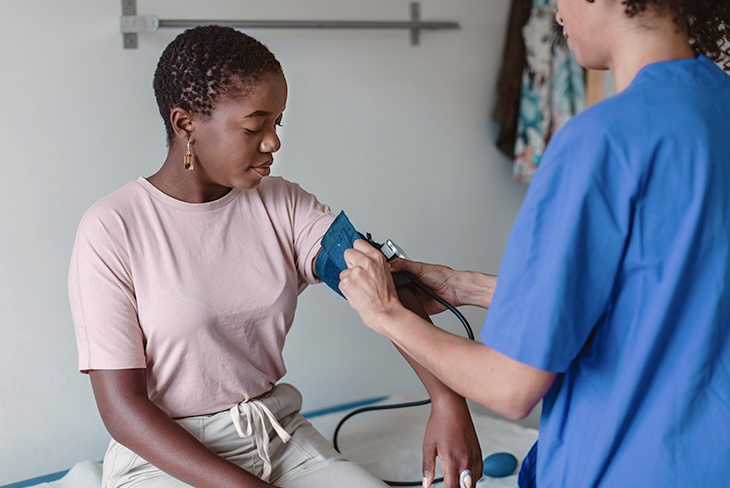What you need to know about high blood pressure

Blood pressure is not a body function we think about very often, if at all. The reality, though, is that we ought to keep tabs on our blood pressure on a fairly regular basis.
‘Despite being the major preventable cause of cardiovascular disease (CVD) worldwide, only around 40% of patients with hypertension are on treatment. Furthermore, only about 35% of them are adequately treated,’ says Dr Charles Kyriakakis, a cardiologist at Life Vincent Pallotti Hospital in Cape Town.
What is high blood pressure?
High blood pressure (HBP) occurs when blood pressure increases to an unhealthy level. Your blood pressure level depends on the amount of blood your heart pumps, as well as the amount of resistance to the blood flow in your arteries.
The narrower your arteries are, the higher your blood pressure will be. High blood pressure is so dangerous because, over time, it could lead to problems that affect the heart and blood vessels of the body.
Signs of high blood pressure
Often referred to as a ‘silent killer’, hypertension sometimes has no symptoms. It could take years for high blood pressure to reach a level that’s severe enough to show symptoms.
Symptoms of severe high blood pressure could include:
- Headaches
- Shortness of breath
- Nosebleeds
- Dizziness
- Chest pain
- Visual changes
If you experience any of these symptoms and particularly if you have high blood pressure, see your doctor immediately.
Reading your blood pressure
The most accurate way to check if you have high blood pressure is to go for regular blood pressure readings. A blood pressure reading is measured in millimetres of mercury (mmHg) and recorded with the systolic number first, followed by the diastolic number.
A systolic measurement measures the pressure in your blood vessels when your heart beats or contracts, while the diastolic is the pressure when your heart rests between contractions.
An optimal BP reading is under 120/80 mmHg; however, a systolic reading under 130 mmHg and a diastolic reading of under 85 mmHg are still considered to be within the normal range.
What causes high blood pressure?
The most common type of hypertension is called primary hypertension. Experts believe it is tied to a family history of hypertension, eating too much salt and an overactive sympathetic nervous system (caused by stress and anxiety).
Secondary hypertension usually has a specific cause and is only found in around 5 to 15% of people with HBP. It is more common in younger individuals. In these cases, it’s important to identify HPB as early as possible since some of the causes may be treatable.
‘Secondary HPB can be caused by chronic kidney disease, a narrowing of the aorta – the major artery supplying blood to the heart – narrowing of the arteries supplying blood to the kidneys and various diseases affecting the endocrine or gland system,’ explains Dr Kyriakakis.
Medication such as non-steroidal anti-inflammatory agents used to treat pain and the combined oestrogen-progesterone oral contraceptive pill may also be culprits.
How is HBP treated?
‘Lifestyle changes can be helpful in controlling HBP,’ says Dr Kyriakakis. He advises eating a healthy diet (less salt, lots of fresh fruit and vegetables) and maintaining an ideal body weight (a body mass index of 20 to 25).
It’s also important to exercise regularly, not to smoke and to limit alcohol intake. ‘Most patients will require medication in addition to lifestyle changes to adequately control their BP. In general, we aim for ≤130/80 mmHg, whilst ≤140/90 mmHg is acceptable in those over 65.’ For secondary hypertension, doctors will treat the specific cause.
How to manage your high blood pressure
Watch your diet
Experts have shown that a diet low in salt but rich in fresh fruit and vegetables, legumes, wholegrains, fish and olive oil, reduces the likelihood of CVD. Foods to avoid if you have HBP include meat, saturated fats and excessive amounts of alcohol.
Get moving
‘Regular aerobic exercise (walking, jogging, swimming or cycling) for 30 minutes five to seven days per week will lower blood pressure and also reduce the risk of cardiovascular disease,’ says Dr Kyriakakis.
Lower your stress
It’s also been proven that psychological stress is linked to hypertension. Dr Kyriakakis recommends managing the pressures of modern life placed on us by technology, including smartphones, so that we get enough downtime to improve our physical and psychosocial health.
The information is shared on condition that readers will make their own determination, including seeking advice from a healthcare professional. E&OE. Life Healthcare Group Ltd does not accept any responsibility for any loss or damage suffered by the reader as a result of the information provided.

